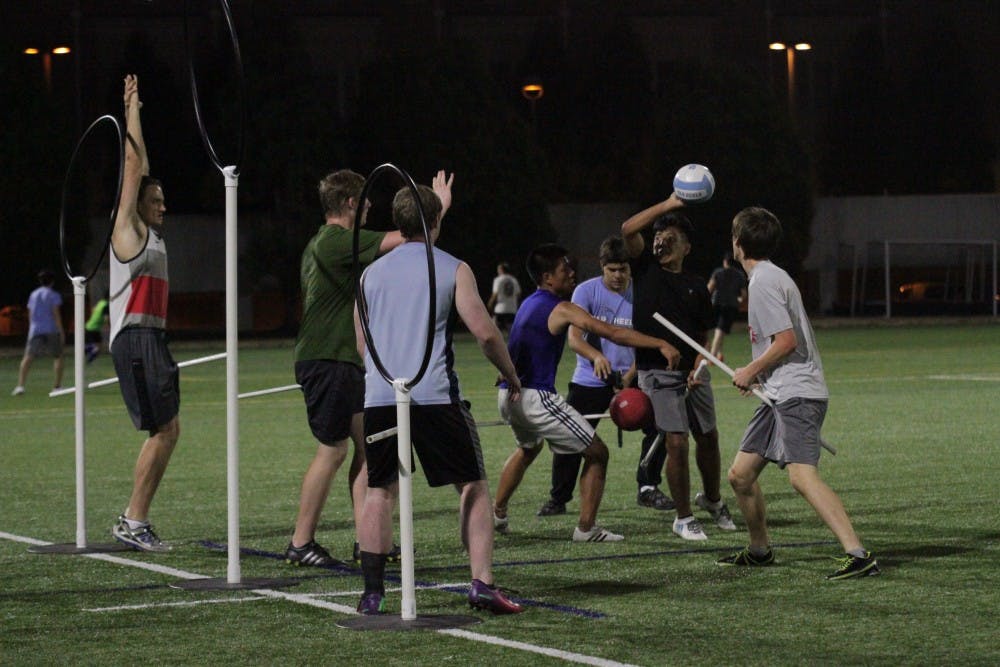The most noticeable is the “quaffle” game, which involves three chasers and a keeper on each team. Chasers try to throw the quaffle, what Muggles call a volleyball, through one of the opponents’ three hoops. The ball can travel through either side of the hoop, and a goal results in 10 points. Players on defense can tackle the opposing player to prevent them from scoring.
The secondary facet is the “bludger” game, involving two beaters on each team and three bludgers — dodgeballs. Beaters throw their bludgers at other players to knock them off their "broom,” forcing the beaten player to run back to their hoop before they can re-engage in play. Having bludger control allows beaters to disrupt the opposing team’s quaffle play, which can lead to easy points for chasers.
The third, and perhaps most entertaining part of the game, is the “snitch” game. Just like in Harry Potter, each team has one seeker who tries to catch the golden snitch – except in Muggle Quidditch the seekers are chasing a person dressed up as a golden snitch. The match ends when a seeker catches the snitch and that player’s team is awarded 30 points.
Snitches are known for being troublesome pranksters, often hiding among spectators and pulling out brooms from underneath unsuspecting players.
All of this goes on while players run around with sticks between their legs.
“It’s a lot tougher than it looks,” said sophomore chaser Alex Russell, a newcomer to the team. “There’s a bit of a learning curve, but once it starts to click and you start learning what tactics to use – when to throw, when to hold, when to rush – it’s really fun.”
Sophomore chaser Sydney Ehinger swam competitively her whole life before coming to UNC. She had little experience in playing team sports, but said she’s loved the change and has met some of her best friends through the team.
“We all get along together really well and we all try to hang out outside of practice,” Ehinger said. “We had a lot of players graduate last year, and we have a lot of newcomers, so that’s something we’re trying to emphasize is rebuilding that team chemistry.”
Quidditch is very different from other sports in the way it promotes gender equity. Title 9 3/4 states that there must be at least two players of two different genders on each team. UNC’s team is comprised of entirely binary-gender players, but the rule also allows for the inclusion of non-binary participants.
Quidditch also differs from traditional sports in the way it’s officiated. Quidditch referees often also play for teams. In addition to playing keeper for UNC’s team, Doughton is also a U.S. Quidditch-certified referee and often travels to tournaments on the weekends. Several other players on the team are also certified referees.
“It’s just sort of a culture we have among the team to really put pride in how we referee,” Doughton said. “I’ve ended up enjoying it a lot.”
The team played in a tournament in Boone this past weekend and went 2-2. They beat Appalachian State University and managed to pull away in overtime against Duke University. The two teams they lost to were community teams comprised of players of varying ages. In years past, community teams competed regionally and nationally against collegiate teams, but for the first time this year, there will be two separate competitions.
To get the day's news and headlines in your inbox each morning, sign up for our email newsletters.
“It’s still good to play these teams because it’s still quality competition,” Doughton said. “It’s definitely worth it for us to have that kind of tape measure game, but we also prefer to play college teams.”
The sport of Quidditch continues to evolve today, but it will never outgrow its magical roots.
“Harry Potter will always be part of the sport, so long as we’re running around on brooms,” Doughton said. “But it’s definitely changed into something different, something a lot more dynamic and something a lot more athletic. We’re trying to get more recognition for it as a sport and not so much as a fan club.”
university@dailytarheel.com



